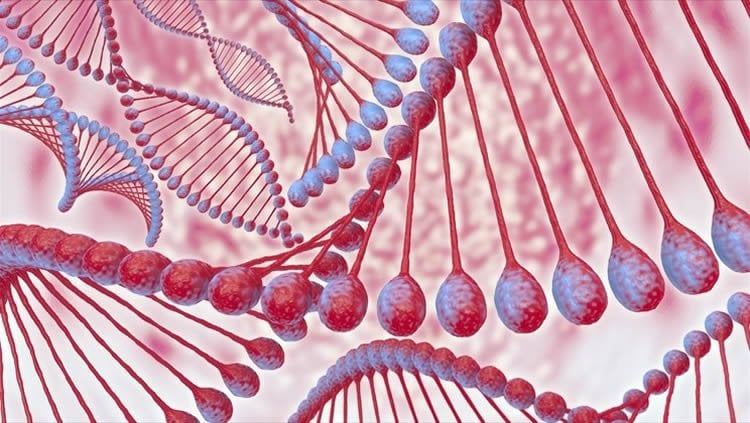Summary: Researchers have taken the first steps into identifying genetics factors associated with OCD.
Source: Yale.
A Yale-led international team of researchers took the first step in identifying genetic factors in Obsessive-Compulsive Disorder (OCD).
According to Dr. Thomas Fernandez, Assistant Professor in the Yale Child Study Center and Department of Psychiatry who led the team, very little research has been done into the genetics of OCD. The treatments have changed little in the past two or three decades, even as treatments for other persistent mental and behavioral diagnoses have multiplied. “We decided to follow one method that proved fruitful in autism genetic research, namely, looking at de novo mutations,” he said. De novo spontaneous mutations that are not inherited from parents.
Partnering with Euripedes C. Miguel and the psychiatrists at the Institute of Psychiatry in Sao Paulo, Brazil, they identified 20 families where the parents have no symptoms, and the children are diagnosed with OCD. These families are popular for genetic research, because it is likely that the children have new mutations of genes intimately involved in OCD.
The 1.5% of the genome that codes for genes, called the exome, of the parents and children was compared to the general population to see if there was a difference in the rate of de novo mutations. The first question to answer, said Fernandez, is “are there more de novo mutations in the OCD population than in the general population?” If the answer is yes, it sets the stage for extensive sequencing.

The pilot group of OCD subjects showed a significantly higher rate of de novo mutations, providing the rationale for larger sequencing efforts. “Currently we are sequencing 200 families,” says Fernandez. The larger sample will allow for analysis of patterns among the mutations, such as networks of genes with common biological functions.
Further research also analyzes a larger proportion of the genome, including regulatory functions, which were left out of the pilot.
Funding: This work was supported by grants from the Fundação de Amparo à Pesquisa do Estado de São Paulo (FAPESP, São Paulo Research Foundation—process: 2008/11537-7; and process: 2011/14658-2); the Brazilian Instituto Nacional de Psiquiatria do Desenvolvimento para Infância e Adolescência (INPD, National Institute of Developmental Psychiatry for Children and Adolescents).
Source: Rachel Erin Horsting – Yale
Image Source: This NeuroscienceNews.com image is adapted from the Yale press release.
Original Research: Full open access research for “Whole-exome sequencing in obsessive-compulsive disorder identifies rare mutations in immunological and neurodevelopmental pathways” by C Cappi, H Brentani, L Lima, S J Sanders, G Zai, B J Diniz, V N S Reis, A G Hounie, M Conceição do Rosário, D Mariani, G L Requena, R Puga, F L Souza-Duran, R G Shavitt, D L Pauls, E C Miguel and T V Fernandez in Translational Psychiatry. Published online March 29 2016 doi:10.1038/tp.2016.30
[cbtabs][cbtab title=”MLA”]Yale. “OCD Population Has Higher Rate of Genetic Mutations: Pilot Study.” NeuroscienceNews. NeuroscienceNews, 8 June 2016.
<https://neurosciencenews.com/ocd-genetic-mutations-4405/>.[/cbtab][cbtab title=”APA”]Yale. (2016, June 8). OCD Population Has Higher Rate of Genetic Mutations: Pilot Study. NeuroscienceNews. Retrieved June 8, 2016 from https://neurosciencenews.com/ocd-genetic-mutations-4405/[/cbtab][cbtab title=”Chicago”]Yale. “OCD Population Has Higher Rate of Genetic Mutations: Pilot Study.” https://neurosciencenews.com/ocd-genetic-mutations-4405/ (accessed June 8, 2016).[/cbtab][/cbtabs]
Abstract
Whole-exome sequencing in obsessive-compulsive disorder identifies rare mutations in immunological and neurodevelopmental pathways
Studies of rare genetic variation have identified molecular pathways conferring risk for developmental neuropsychiatric disorders. To date, no published whole-exome sequencing studies have been reported in obsessive-compulsive disorder (OCD). We sequenced all the genome coding regions in 20 sporadic OCD cases and their unaffected parents to identify rare de novo (DN) single-nucleotide variants (SNVs). The primary aim of this pilot study was to determine whether DN variation contributes to OCD risk. To this aim, we evaluated whether there is an elevated rate of DN mutations in OCD, which would justify this approach toward gene discovery in larger studies of the disorder. Furthermore, to explore functional molecular correlations among genes with nonsynonymous DN SNVs in OCD probands, a protein–protein interaction (PPI) network was generated based on databases of direct molecular interactions. We applied Degree-Aware Disease Gene Prioritization (DADA) to rank the PPI network genes based on their relatedness to a set of OCD candidate genes from two OCD genome-wide association studies (Stewart et al., 2013; Mattheisen et al., 2014). In addition, we performed a pathway analysis with genes from the PPI network. The rate of DN SNVs in OCD was 2.51 × 10−8 per base per generation, significantly higher than a previous estimated rate in unaffected subjects using the same sequencing platform and analytic pipeline. Several genes harboring DN SNVs in OCD were highly interconnected in the PPI network and ranked high in the DADA analysis. Nearly all the DN SNVs in this study are in genes expressed in the human brain, and a pathway analysis revealed enrichment in immunological and central nervous system functioning and development. The results of this pilot study indicate that further investigation of DN variation in larger OCD cohorts is warranted to identify specific risk genes and to confirm our preliminary finding with regard to PPI network enrichment for particular biological pathways and functions.
“Whole-exome sequencing in obsessive-compulsive disorder identifies rare mutations in immunological and neurodevelopmental pathways” by C Cappi, H Brentani, L Lima, S J Sanders, G Zai, B J Diniz, V N S Reis, A G Hounie, M Conceição do Rosário, D Mariani, G L Requena, R Puga, F L Souza-Duran, R G Shavitt, D L Pauls, E C Miguel and T V Fernandez in Translational Psychiatry. Published online March 29 2016 doi:10.1038/tp.2016.30






